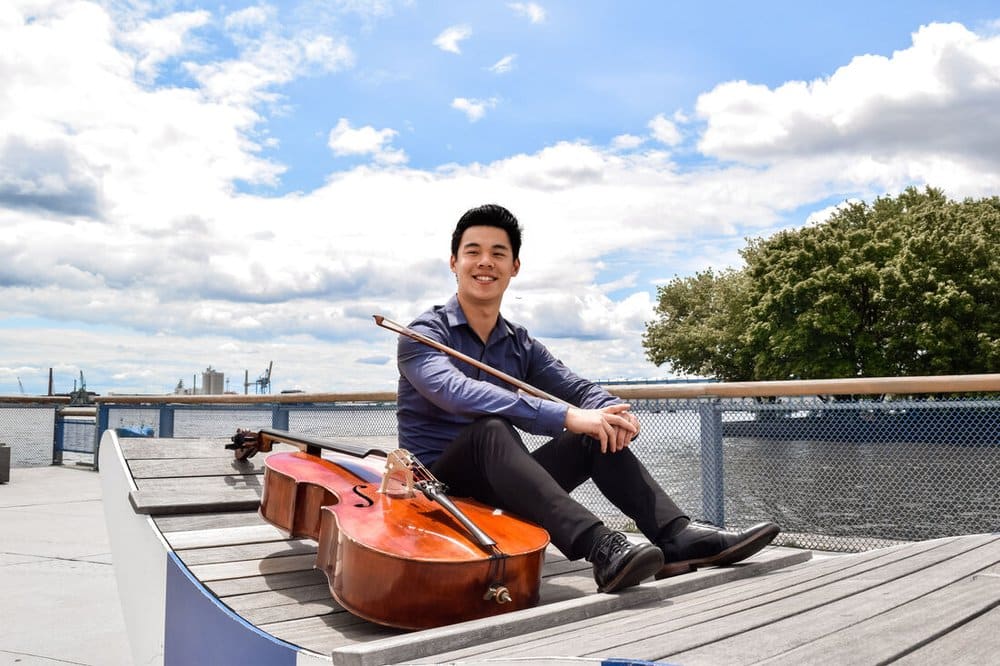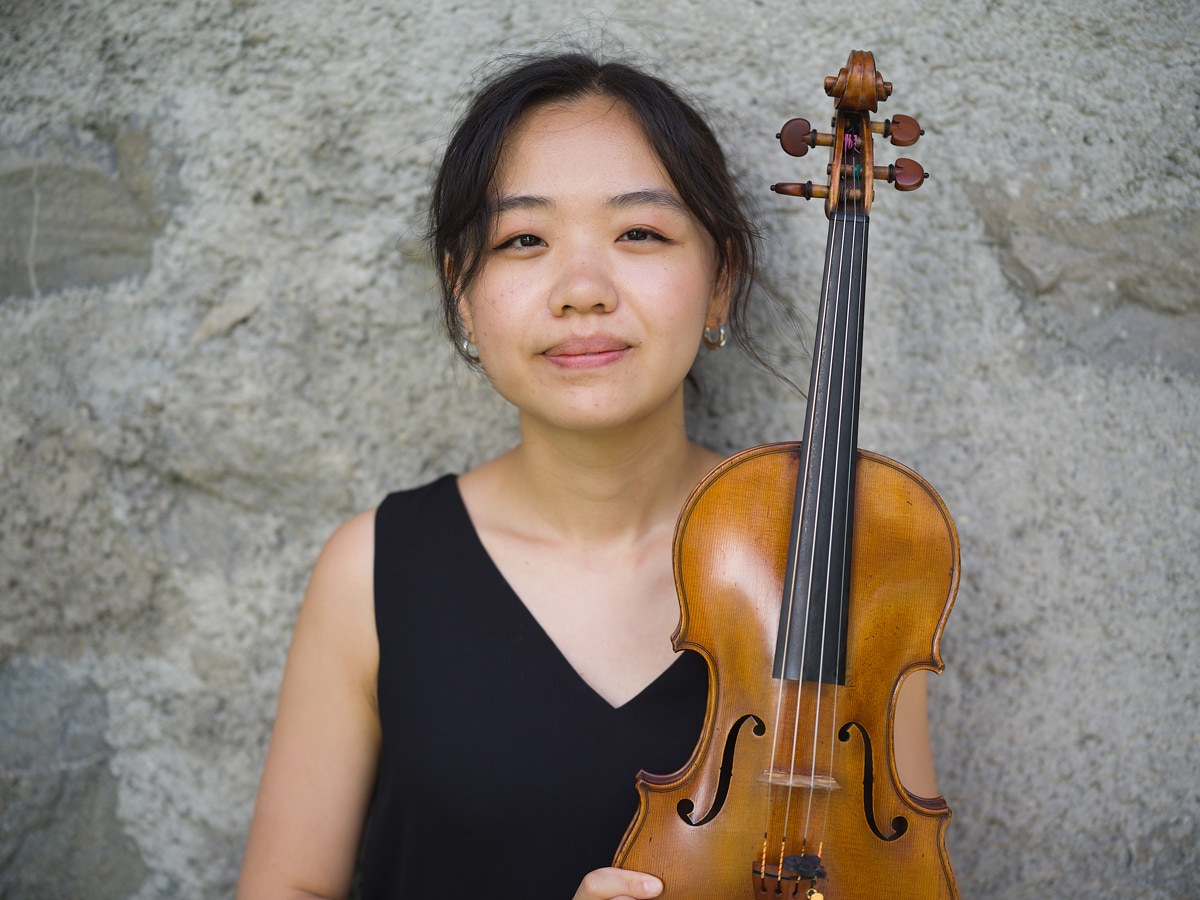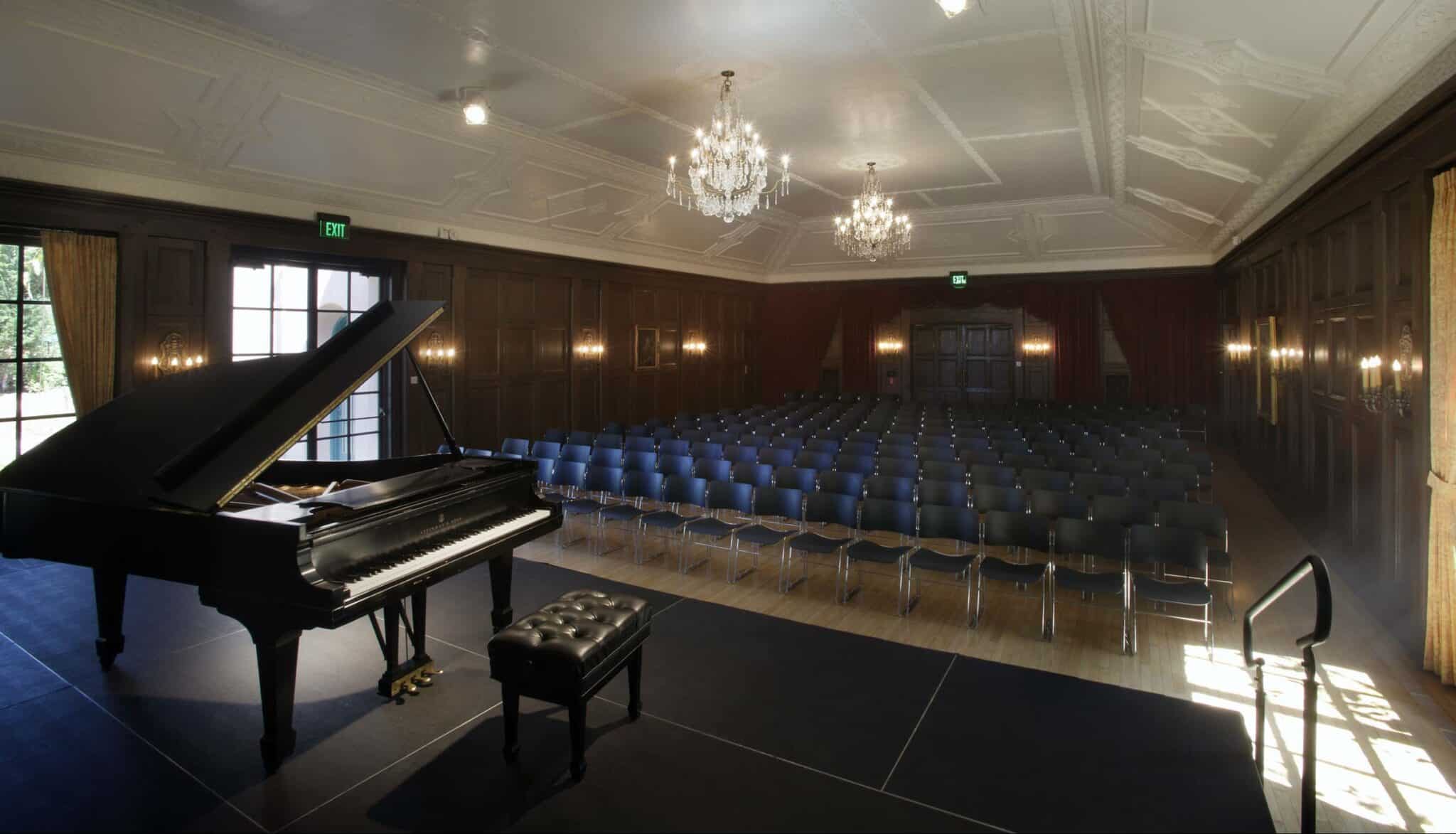HANDEL (1685-1759)
Suite No. 3 in D Minor
Prelude
Allegro (Fugue)
Allemande
In 1720, George Frideric Handel self-published a set of keyboard works called Suites de pièces pour le clavecin, often referred to as the “Eight Great Suites.” Most of these suites had been written earlier, some possibly as far back as 1706, but up until that point he had refrained from publishing them. He referenced his decision to offer them for public consumption in a note that preceded the first edition:
“I have been obliged to publish Some of the following Lessons, because Surrepticious and incorrect Copies of them had got Abroad. I have added several new ones to make the Work more usefull*, which if it meets with a favourable Reception; I will Still proceed to publish more, reckoning it my duty, with my Small Talent, to serve a Nation from which I have receiv’d so Generous a Protection.”
The passive wording of the statement can be read as either politeness or snark (or both), but either way it raises an important question: was Handel dealing with…pirates? Not the eyepatch and parrot-on-the-shoulder kind who deal in theft on the high seas, but their landlubbing distant kin who deal in theft of intellectual property. The simple answer is yes. And no.
It is true that Handel was hounded throughout his life by the issue of unauthorized publication of his works, and it is fairly evident from the tone of the above preface that it must have bothered him to an extent. Besides releasing his own publications, he sought a legal remedy by taking out a Royal Privilege, ostensibly giving him a 14-year monopoly on the publication of his works. Music scholars from later generations made a lot of hay out of these acts of musical piracy, decrying the unscrupulous publishers who would dare to make an illicit profit on the Genius of a Great Composer. But in Handel’s day, this was simply an accepted part of the music business. In fact, England’s Copyright Act of 1710 did not apply to music, at all. And the Royal Privilege granted to Handel by King George I? That was a nice thing on paper, but most English legal scholars of the time disputed the Crown’s right to issue such proclamations.
The simple fact is publishers printed things without proper “rights” all the time. Handel knew this, which is why he, instead of taking his issue to the courts, remedied his particular situation in the widely accepted (and much cheaper) fashion of the day: he re-released the works in question himself and announced it in the newspapers. In November of 1720 Handel advertised his publication of the suites in London’s Daily Courant, where in a slightly more forcefully worded version of his preface he added that he was “obliged” to release the works to “prevent the publick being imposed upon” by the “incorrect” pirated version. This method of throwing shade on the quality of an offending publication was effective, frequently used, and, at the time, the only real recourse in such cases.
That scholars have made such a meal out of Handel being wantonly defrauded by pirate publishers tells us more about the scholars’ cultural milieu than Handel’s. This Handel-as-victim narrative began cropping up in the 1800s, after aesthetic and philosophical movements gave rise to the notion of artists as genius creators of special commodities and the concept of intellectual property, the belief that ideas could be owned. In 1720, no one would have thought of it this way—not even Handel. Dealing with “pirates” was simply a risk of doing business. Interestingly enough, Handel’s music would play a role in changing English copyright law after his death in a court battle between—somewhat ironically—two publishers. This helped set precedent for a 1777 ruling on a case brought by the son of one of Handel’s contemporaries. The court in this landmark decision sided with Johann Christian Bach and finally agreed that music was protected by copyright law in England.
BACH (1685-1750) The Well-Tempered Clavier, Book 1 Prelude and Fugue No. 9 in E Major, BWV 854 Prelude and Fugue No. 13 in F-sharp Major, BWV 858 In 1893, the German theorist Hugo Riemann undertook a somewhat surprising task—analyzing the affective qualities of all forty-eight preludes and fugues from Bach’s Well-Tempered Clavier. While this seems like a strange practice, it was actually rooted in a long history. In ancient Greece, many scholars believed that the different musical modes (scales) contained special properties that could influence the body’s humors and result in certain behavioral or moral effects. As time went on, though, more scientific and observational approaches of thinking became predominant and the workings of music were solidified into a concrete set of rules and practices. Still, some eighteenth and nineteenth-century theorists attempted to preserve a connection to past ideals.
*Today’s movements come from the Suite in D Minor HWV 428, one of suites newly composed for the 1720 publication.
– Henry MichaelsBACH (1685-1750) The Well-Tempered Clavier, Book 1 Prelude and Fugue No. 9 in E Major, BWV 854 Prelude and Fugue No. 13 in F-sharp Major, BWV 858 In 1893, the German theorist Hugo Riemann undertook a somewhat surprising task—analyzing the affective qualities of all forty-eight preludes and fugues from Bach’s Well-Tempered Clavier. While this seems like a strange practice, it was actually rooted in a long history. In ancient Greece, many scholars believed that the different musical modes (scales) contained special properties that could influence the body’s humors and result in certain behavioral or moral effects. As time went on, though, more scientific and observational approaches of thinking became predominant and the workings of music were solidified into a concrete set of rules and practices. Still, some eighteenth and nineteenth-century theorists attempted to preserve a connection to past ideals.
While many concepts in Riemann’s study align with the ancient Greeks, they are presented through a Romantic lens and outline the era’s preoccupations with emotion, subjectivity, and the beauty of nature. For instance, Riemann interprets the deliciously-succinct E major Fugue (BWV 854) from Book I as “the joy of a wondering life which… befits the spring mood of the key.” Natural imagery is also present in his analysis of the F-sharp major Prelude (BWV 858), also from Book I. “While listening,” Riemann muses, “One can only think of wood, of flowers, and of the song of birds,” connecting the gentle, carefree swaying of the Prelude with bucolic imagery.
Whether or not one agrees with Riemann’s approach to The Well-Tempered Clavier, the importance of these works is undeniable. Bach completed the first book in 1722 while working in Cöthen, with the second book following in 1742. Though the pieces can be enjoyed purely on aesthetic terms, Bach’s intentions appeared to be largely pedagogical, dedicating the collection to “both the education of the industrious musical youngster and the enjoyment of those well-versed in this material.” Indeed, the individual preludes and fugues remain a vital stepping stone for aspiring young pianists to this day. And what of Riemann’s analysis? Though his philosophical approach doesn’t align too well with our modern-day sensibilities, The Well-Tempered Clavier retains an indelible power over the imagination, inspiring a bevy of interpretations, approaches, and ideas about Bach’s timeless music.
– Kevin McBrien
IVES (1874-1954)
Piano Sonata No. 2, Concord, Mass., 1840-60
“The Alcotts”
“Since I had my little piano, I am perfectly satisfied. I only wish we may all keep well and be together, nothing else.” So says the character Beth March to her friend Laurie in Louisa May Alcott’s semi-autobiographical novel Little Women. There is a certain profound simplicity in Beth’s expression of contentment, her wish for only togetherness and music.
This profound simplicity lies at the heart of “The Alcotts,” the third movement of American composer Charles Ives’s Concord Sonata. At the beginning of his Essays Before a Sonata, a short book meant to accompany the musical work, Ives openly wondered whether music had the ability to express “the value of anything, material, moral, intellectual, or spiritual, which is usually expressed in terms other than music?” It’s a weighty question, to be sure. Toward the end of the essays, Ives dances around a kind of answer:
“But maybe music was not intended to satisfy the curious definiteness of man. Maybe it is better to hope that music may always be a transcendental language in the most extravagant sense. Possibly the power of literally distinguishing these “shades of abstraction”—these attributes paralleled by “artistic intuitions” (call them what you will)—is ever to be denied man for the same reason that the beginning and end of a circle are to be denied.”
Two words lie at the heart of both the essays and the music: intuition and transcendental. The Concord Sonata is Ives’s musical representation of New England transcendentalism, a philosophical movement that was personally impactful for Ives. Each movement of the work represents a transcendentalist figure, the third focusing on Bronson Alcott and his daughter Louisa May Alcott (the other movements are named for Ralph Waldo Emerson, Nathaniel Hawthorne, and Henry David Thoreau, respectively). These transcendentalist thinkers believed in the inherent good of all things and the divinity of individual instinct. It was, as the movement’s official historian Octavius B. Frothingham wrote, “an enthusiasm, a wave of sentiment, a breath of mind that caught up such as were prepared to receive it, elated them, transported them, and passed on.” Ives was a man caught up by this wave of sentiment, and through his music he meant to do the same for his listeners. One way he did this was through quotation. His works are often shot through with snippets of popular songs, hymns, and other music, much of it associated with Ives’s personal memories. In the Concord Sonata, he references throughout the famous opening of Beethoven’s Fifth Symphony, which has been often described as the knocking of fate. “There is an ‘oracle’ at the beginning of the Fifth Symphony,” he wrote in the Essays:“In those four notes lies one of Beethoven’s greatest messages. We would place its translation above the relentlessness of fate knocking at the door, above the greater message of destiny and strive to bring it towards the spiritual message of Emerson’s revelations, even to the ‘common heart’ of Concord—the soul of humanity knocking at the door to the divine mysteries, radiant in the faith that it will be opened—and the human become the divine!”
Ives often tended toward the experimental in his music, and, sure enough, the movements that surround “The Alcotts” are considerably more thorny than this beautiful vision of New England domesticity. Here the Beethoven motive is mixed with Protestant hymns, conjuring up images of Beth—the real one upon whom the character is based—playing on “the little old spinet-piano Sophia Thoreau gave to the Alcott children.” Ives tells us in the Essays and shows us through the sonata that in the Alcotts’ simple home there is “a stronger sense of being nearer some perfect truth than a Gothic cathedral or an Etruscan villa.” There is, he says, in this movement and the people it represents “a strength of hope that never gives way to despair.”
– Henry Michaels
WILLIAM BOLCOM (b. 1938) Graceful Ghost Rag Grappling with the persistent divide between “serious” and “popular” music has always been one of the biggest creative dilemmas for a composer. Some embrace it and strive to write music of the utmost seriousness. Others find ways—either subtly or blatantly—to rupture the divide. William Bolcom’s career is one illustration of the latter. After studying under the tutelage of Milhaud and Messiaen, Bolcom quickly became entranced by Boulez and Stockhausen, mirroring their thorny musical language in his early compositions. However, other concerns kept lingering in the back of his mind. Bolcom later reflected, “I was trained as a classical musician all my life, but I was always interested in popular music. According to my teachers it wasn’t as good, but I loved it anyway.” In the 1960s, Bolcom received a score of Scott Joplin’s opera Treemonisha and his interest in popular music hit with a renewed force. He began championing Joplin’s rags on recordings and in concert, all at a time when Joplin had yet to be taken seriously by the classical music industry. Many scholars and performers now recognize Bolcom as one of the major figures in the twentieth-century ragtime revival, which arguably culminated when the Joplin-infused score for The Sting won the Oscar for Best Adapted Score in 1974. Bolcom also began infusing popular elements into his own compositions, encompassing everything from jazz to Broadway show tunes and, not surprisingly, ragtime. He even composed several original rags. One of these, the Graceful Ghost Rag from 1970, showcases the convergence of Bolcom’s creative interests and his exploration of a new, more accessible musical language. The connotation of the titular “ghost” is also much different than most modern-day depictions of the paranormal lead one to believe. Bolcom wrote this rag in memory of his late father—a “graceful spirit,” according to the composer—and as such, intended the title to align more closely with the softer, seventeenth-century implications of the word. The charmingly mellow temperament of the rag itself confirms this sweet homage to Bolcom Sr., which, at roughly four-and-a-half minutes long, is over much too quickly. Perhaps this “ghost” is a bit of a trickster after all… – Kevin McBrien
WILLIAM BOLCOM (b. 1938) Graceful Ghost Rag Grappling with the persistent divide between “serious” and “popular” music has always been one of the biggest creative dilemmas for a composer. Some embrace it and strive to write music of the utmost seriousness. Others find ways—either subtly or blatantly—to rupture the divide. William Bolcom’s career is one illustration of the latter. After studying under the tutelage of Milhaud and Messiaen, Bolcom quickly became entranced by Boulez and Stockhausen, mirroring their thorny musical language in his early compositions. However, other concerns kept lingering in the back of his mind. Bolcom later reflected, “I was trained as a classical musician all my life, but I was always interested in popular music. According to my teachers it wasn’t as good, but I loved it anyway.” In the 1960s, Bolcom received a score of Scott Joplin’s opera Treemonisha and his interest in popular music hit with a renewed force. He began championing Joplin’s rags on recordings and in concert, all at a time when Joplin had yet to be taken seriously by the classical music industry. Many scholars and performers now recognize Bolcom as one of the major figures in the twentieth-century ragtime revival, which arguably culminated when the Joplin-infused score for The Sting won the Oscar for Best Adapted Score in 1974. Bolcom also began infusing popular elements into his own compositions, encompassing everything from jazz to Broadway show tunes and, not surprisingly, ragtime. He even composed several original rags. One of these, the Graceful Ghost Rag from 1970, showcases the convergence of Bolcom’s creative interests and his exploration of a new, more accessible musical language. The connotation of the titular “ghost” is also much different than most modern-day depictions of the paranormal lead one to believe. Bolcom wrote this rag in memory of his late father—a “graceful spirit,” according to the composer—and as such, intended the title to align more closely with the softer, seventeenth-century implications of the word. The charmingly mellow temperament of the rag itself confirms this sweet homage to Bolcom Sr., which, at roughly four-and-a-half minutes long, is over much too quickly. Perhaps this “ghost” is a bit of a trickster after all… – Kevin McBrien
[big-cast]
Kevin McBrien’s contributions come courtesy of the Music Academy’s partnership with the UC Santa Barbara Department of Music, a key part of our new Project Resonance initiative. To learn more about Project Resonance, read the Resonance Blog’s introductory post here.





